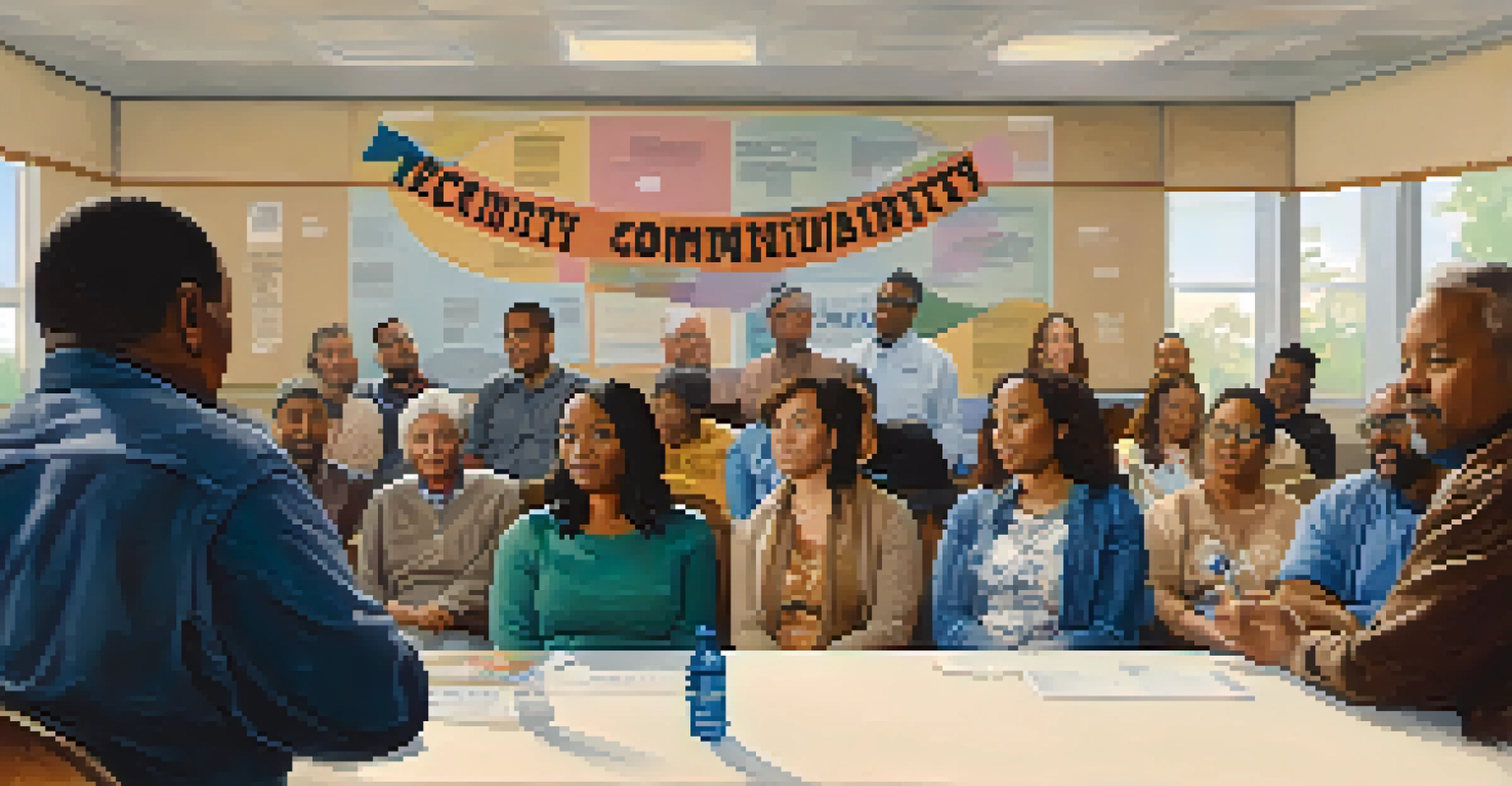The Role of Local Government in Minneapolis Social Issues

Understanding the Local Government Structure in Minneapolis
Minneapolis operates under a city council system, which plays a critical role in shaping policies that affect social issues. The council consists of 13 members, each representing different neighborhoods, ensuring a diverse range of voices in local governance. This structure allows for community engagement, where residents can voice their concerns and influence decision-making processes.
The government closest to the people serves the people best.
The mayor, who is also an integral part of this structure, oversees the city’s executive functions. This collaboration between the mayor and the city council is essential in addressing pressing social issues like housing, education, and public safety. Together, they work to create policies that reflect the needs and values of Minneapolis residents.
Understanding this framework is vital because it lays the groundwork for how social issues are prioritized and addressed. Local government acts as a bridge between community needs and available resources, steering initiatives that aim to improve the quality of life for all Minneapolis inhabitants.
Local Government's Role in Housing Affordability
One of the most pressing social issues in Minneapolis is housing affordability. The local government has implemented various programs aimed at increasing access to affordable housing for low and moderate-income families. These initiatives include zoning reforms and partnerships with nonprofit organizations to develop affordable housing units.

Furthermore, the city has adopted policies to prevent displacement of residents in gentrifying neighborhoods. By promoting housing stability, local government not only addresses immediate needs but also fosters long-term community resilience. This proactive approach is essential in combating homelessness and ensuring that all residents have a place to call home.
Local Government Tackles Housing Issues
Minneapolis local government implements programs and policies to enhance housing affordability and prevent displacement for low-income families.
Through these strategies, local government plays a pivotal role in shaping the housing landscape of Minneapolis. By prioritizing affordable housing, they can directly influence residents' quality of life and contribute to a more equitable city.
Addressing Racial Inequities in Minneapolis
Minneapolis has a complex history of racial inequities, and the local government has recognized the need for systemic change. Initiatives aimed at promoting racial equity include the establishment of the Racial Equity Community Advisory Committee, which advises the city on policies and practices that can reduce disparities. This committee is an example of how local governments can create platforms for marginalized voices.
In a democracy, the citizen is the most important element of the government.
Moreover, local government has been working to reform police practices following the tragic events surrounding George Floyd's death. These reforms include reallocating funds to community-based safety programs and enhancing oversight of law enforcement. Such actions signify a commitment to addressing racial injustices and building trust within the community.
By tackling these deep-rooted issues, Minneapolis’ local government aims to foster a more inclusive and just society. This journey towards equity requires ongoing dialogue and collaboration with residents to ensure that all voices are heard and represented.
Promoting Economic Development and Job Creation
Local government plays a significant role in stimulating economic development and creating job opportunities in Minneapolis. Through initiatives like the Minneapolis Economic Development Authority, the city provides support for small businesses, especially those owned by underrepresented groups. This focus on inclusivity helps to strengthen the local economy and empower communities.
In addition to supporting small businesses, local government invests in workforce development programs that equip residents with skills for high-demand jobs. By collaborating with educational institutions and training organizations, the city ensures that its workforce is competitive and prepared for the future job market. This not only benefits individuals but also contributes to overall economic growth.
Focus on Racial Equity Initiatives
The city has established committees and reformed police practices to address systemic racial inequities and foster community trust.
By prioritizing economic development, local government can address social issues such as poverty and unemployment. A thriving local economy creates opportunities for residents and fosters a sense of community pride, ultimately leading to a more vibrant Minneapolis.
Enhancing Public Health and Safety Initiatives
Public health and safety are paramount concerns for any local government, and Minneapolis is no exception. The city has implemented various programs designed to improve community health, including access to healthcare services and initiatives aimed at reducing substance abuse. These efforts are crucial, especially in underserved areas where health disparities are prevalent.
Moreover, local government has focused on creating safe public spaces and reducing crime rates through community policing strategies. By fostering relationships between law enforcement and residents, the city aims to enhance public safety and build trust. This collaborative approach helps to create a safer environment for all citizens.
Through these public health and safety initiatives, local government can better address the root causes of social issues. By investing in community well-being, Minneapolis is working towards a healthier and safer future for its residents.
Investing in Education and Youth Programs
Education is a critical component of social equity, and Minneapolis local government recognizes its importance. The city collaborates closely with Minneapolis Public Schools to enhance educational opportunities for students, particularly those from low-income backgrounds. This partnership focuses on resource allocation, facility improvements, and after-school programs that support student success.
Moreover, local government invests in youth programs that promote leadership and civic engagement. Initiatives like the Minneapolis Youth Council empower young people to actively participate in local governance and community decision-making. By fostering a sense of responsibility and community involvement, these programs help shape the next generation of leaders.
Economic Development and Job Growth
Through support for small businesses and workforce development, local government aims to stimulate economic growth and create job opportunities.
Investing in education and youth programs not only addresses immediate social issues but also sets the foundation for long-term community growth. By prioritizing education, local government contributes to breaking the cycle of poverty and creating opportunities for future generations.
Engaging Communities through Outreach and Communication
Effective communication is essential for local government to address social issues successfully. In Minneapolis, city officials actively engage with residents through town hall meetings, surveys, and community forums. This open dialogue allows community members to share their concerns and ideas, fostering a sense of ownership in local governance.
Additionally, local government utilizes digital platforms to reach a broader audience. By leveraging social media and online resources, they ensure that residents are informed about policies and initiatives that impact their lives. This transparency builds trust and encourages civic participation, which is vital for a healthy democracy.

Through outreach and communication, local government can better understand the needs of its citizens. This two-way engagement is crucial for developing effective solutions to social issues, ensuring that all voices are heard and represented in the decision-making process.
The Future of Local Government's Role in Social Issues
As Minneapolis continues to evolve, the role of local government in addressing social issues will be more important than ever. The challenges facing the city, from housing and racial inequities to public health and economic disparities, require innovative and collaborative approaches. Local government must remain adaptable and responsive to the changing needs of its residents.
Looking ahead, there is a growing emphasis on sustainability and climate resilience in local policies. By integrating environmental considerations into social initiatives, government can create a more equitable and sustainable future for all Minneapolis residents. This holistic approach recognizes the interconnectedness of social and environmental issues.
Ultimately, the future of local government in Minneapolis will depend on its ability to foster inclusivity, prioritize equity, and engage with the community. By continuing to adapt and innovate, local government can play a transformative role in addressing social challenges and improving the lives of all citizens.